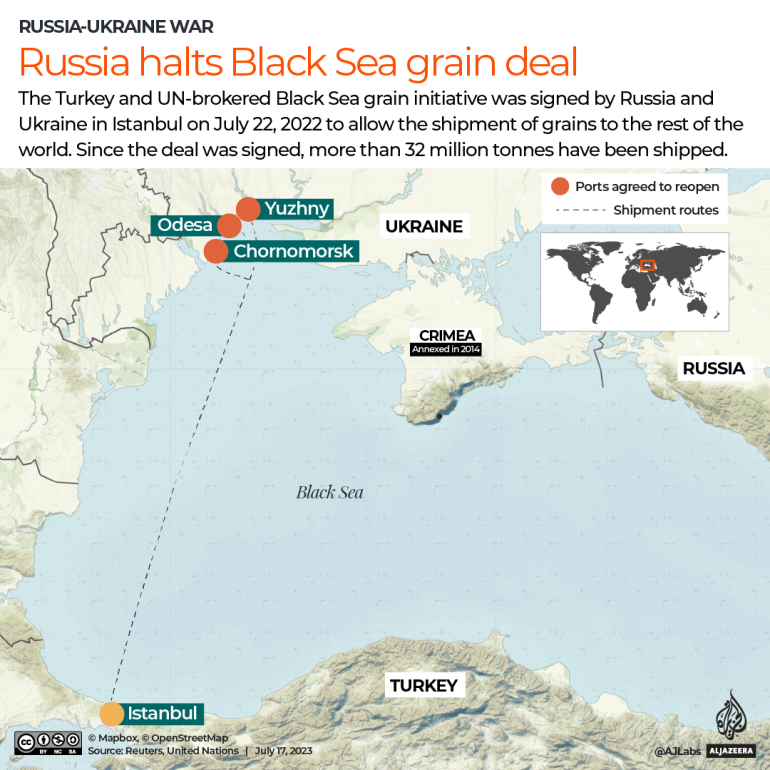US urges nations to tell Russia to stop using grain as ‘blackmail’
Blinken accuses Russia of assault on global food system, says hunger must not be ‘weaponised’ after Moscow quits grain deal.

US Secretary of State Antony Blinken has challenged all countries to tell Russia to stop using the Black Sea and Ukraine’s grain as “blackmail” and stop treating the world’s hungry and vulnerable people as leverage in its “unconscionable war”.
America’s top diplomat lashed out at Russia at a United Nations Security Council meeting on Thursday for ignoring the world’s appeals and pulling out of the year-old deal that allowed Ukraine to ship more than 32 tonnes of grain from Black Sea ports to needy countries.
Keep reading
list of 3 itemsAfter ending deal, Russia warns against Black Sea grain shipments
The countries hit the hardest by Russia’s grain deal exit
“Hunger must not be weaponised,” he told the 15-member council.
“And what has Russia’s response been to the world’s distress and outrage? Bombing Ukrainian granaries, mining port entrances, threatening to attack any vessel in the Black Sea,” Blinken said.
The grain agreement had allowed Ukrainian grain exports via the sea during the conflict between the two countries.
Moscow refused to extend the deal, leading to a spike in grain prices that hit poorer countries hard.
“Every member of this council, every member of the United Nations should tell Moscow enough, enough using the Black Sea as blackmail,” said Blinken.
If there was a revival of the deal, the US would continue to do “whatever is necessary” to ensure Russia can freely export food if there was a revival of the deal, Blinken told reporters.
‘Dig deeper’
The agreement, signed in July 2022 with Turkey acting as UN-backed facilitator between Ukraine and Russia, aimed to alleviate the risk of famine in the world by guaranteeing markets access to Ukrainian grain despite the war.
Moscow is demanding guarantees on another agreement concerning its own exports, in particular of fertiliser components.
Russia’s deputy UN Ambassador Dmitry Polyanskiy said Western sanctions were impacting Russian food and fertiliser exports.
“Until the illegitimate obstacles artificially created by the West affecting Russian economic operators’ ability to supply agricultural products are eliminated, it will hardly be possible to restore the normal functioning of supply chains and address other global food security issues,” he told the debate.
Russian drones on Wednesday damaged infrastructure at a Ukrainian port on the Danube, as Moscow targeted facilities vital for grain shipments from Ukraine following the collapse of the deal.
Blinken said grain prices had increased by more than eight percent around the world since Russia’s withdrawal.
